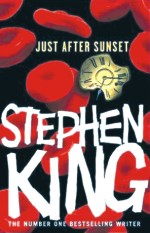 When I interviewed Stephen King for this paper in 2006, he told me that the night before we met he'd had a dream that was so vivid he'd woken up in the middle of the night and wondered how anybody "could have so much power in their heads to have a dream like that". I begged him to tell me about the dream but he refused, saying he was certain it would show up in his fiction sooner or later. In the end notes to his latest collection, Just After Sunset, King expands on what he was going through at the time. Before coming to England to promote his novel Lisey's Story, he'd decided to go cold turkey and stop using the anti-depressant drug Doxepin, which he'd been taking to numb the chronic pain he'd been experiencing since his road accident in 1999. The side effects of quitting this drug were astonishing dreams.
When I interviewed Stephen King for this paper in 2006, he told me that the night before we met he'd had a dream that was so vivid he'd woken up in the middle of the night and wondered how anybody "could have so much power in their heads to have a dream like that". I begged him to tell me about the dream but he refused, saying he was certain it would show up in his fiction sooner or later. In the end notes to his latest collection, Just After Sunset, King expands on what he was going through at the time. Before coming to England to promote his novel Lisey's Story, he'd decided to go cold turkey and stop using the anti-depressant drug Doxepin, which he'd been taking to numb the chronic pain he'd been experiencing since his road accident in 1999. The side effects of quitting this drug were astonishing dreams.
The dream he mentioned that afternoon in London, which turns out to have inspired a new story called "Graduation Afternoon", featured a vast mushroom cloud blossoming over New York. As King writes, it's not a particularly unusual image, having been used in countless movies and TV programmes, but what he found so disturbing (and compelling) was his sense that the dream was not just a premonition of something that could happen, but something that would happen.
After all this build up, the six-page story comes as something of a disappointment, as does the other nightmare-inspired story in the collection, "Harvey's Dream". King sets great store by the subconscious imagination, having named one collection Nightmares and Dreamscapes and written in his introduction to Michel Houellebecq's book on H P Lovecraft about wanting to write a story called "Lovecraft's Pillow", believing that the dreams of a man who wrote such terrifying stories must surely be infectious. But in both of these stories, which seem to have been written quickly, he seems less interested in creating compelling fiction than in transcribing his night terrors.
Fortunately, the other 11 stories in this collection are all brilliant and, taken as a whole, this is King's finest book of short fiction since 1985's Skeleton Crew. The subject matter varies widely (from a Satanic cat to a man who torments his homosexual neighbour by imprisoning him in a chemical toilet), but the collection gains thematic unity from King's focus, in the majority of stories, on how conventional anxieties and fears can be amplified still further in the post 9/11 age. In the notes to a story entitled "The Things They Left Behind", King writes of how he was deeply and fundamentally affected by the collapse of the Twin Towers, but felt a reluctance to say anything about "an event that has become as much an American touchstone as Pearl Harbor or the assassination of John Kennedy". This sensitivity ensures that the story he has eventually written about the event is one of the most compassionate fictional responses to 9/11 by an American author, and the fact that he has chosen a short story rather than a novel to address that day indicates King's reluctance to trade on this terror.
In fact, somewhat surprisingly, King's main aim in this collection seems less to shock than to reassure. His tales may feature serial killers, ghosts, abusive boyfriends and aeroplanes (by the way, ignore King's advice in his introduction that this might be a good book to kill a dull aeroplane flight; I read it on a plane to New York and it gave me a serious case of the heebie-jeebies), but his emphasis in this collection is on survival, and if survival's not possible, then in the possible consolations of the afterlife.
King doesn't believe in organised religion, but he thinks that humans survive death in one way or another, a possibility that inspires the two most charming stories in the collection, "Willa" and "Ayana". King's folksy charm has always been a major part of his appeal (not for nothing does he refer to himself as "Uncle Stevie"), but never before has he seemed quite so keen to guide the reader safely through a dark period, perhaps the only sane response to a period when any horrors he can conjure are easily topped by the nightly news. It may seem odd to turn to a horror writer for comfort, but if that's what you're looking for, King's your man. Sure, he enjoys rattling the chains as much as ever (the collection ends with him gleefully reminding the reader to check their oven and back door), but the possibility that we might genuinely be in the end times is too bleak a prospect for even a grand horror-master to relish.
This review first appeared in The Independent.
